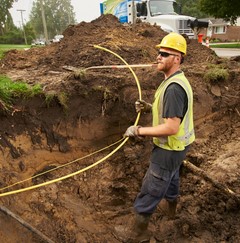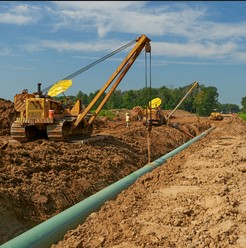Following Natural Gas from the MI Border to Your Home
On a cold winter day in Michigan, you turn your furnace up a few degrees to warm your home. Without missing a beat, your furnace kicks on and you go about your day. What you may not think about is how the natural gas you use for heating makes it to your home. The process of warming your home is more complex than you might think.
 We start warming your home by shopping for natural gas inside and outside of Michigan months before you even need it. To help serve our customers, we purchase natural gas in the summer months while prices are at their lowest, allowing us to make prices affordable throughout the cold months. While we do purchase half the gas required by our customers in the summer and store for the winter, there is gas constantly flowing into our system from suppliers.
We start warming your home by shopping for natural gas inside and outside of Michigan months before you even need it. To help serve our customers, we purchase natural gas in the summer months while prices are at their lowest, allowing us to make prices affordable throughout the cold months. While we do purchase half the gas required by our customers in the summer and store for the winter, there is gas constantly flowing into our system from suppliers.
This is possible thanks to our 15 storage fields with 1,000 storage wells and seven compressor stations, some of which store natural gas underground.
All the gas that reaches our customers must go through one of our seven compressor stations. A compressor station is used to take gas from the interstate pipelines and push it to our transmission pipes. Traveling through 28,000 miles of pipelines, gas will go to storage fields, or right to city gates (a measuring station that distributes gas) and into homes.
We don’t store our gas in an underground container like one might think. Instead, it is stored in ancient bedrock similar to what we see today in a coral reef. The bedrock was once filled with Michigan’s own crude oil and natural gas, and now creates the perfect porous space to hold this valuable fuel nearby. The natural gas is stored for many months and pulled when needed.
Our teams pull gas out of storage fields, and work on cleaning and pressurizing it to move reliably through the system before sending it off to a city gate. Cleaning the gas is a crucial step to keep our systems in great shape, compressors and other elements in our systems are intricate. Dirt and salt could plug our equipment and cause a failure that could lead to a safety incident. Gas is pressurized by being pushed and pulled through pipelines to keep it continuously pressurized while traveling, before reaching a city gate. Pressurization is needed in order to flow through the pipes, otherwise it would sit in one spot.
 Pressure leaving a city gate is 60 PSI, this gives it enough pressure to travel to homes. By the time it goes into homes and businesses it’s ¼ PSI, thanks to the meter on your home regulating the pressure. Gas pressure lowering does not mean the quality of gas has gone down. The pressure is higher leaving a city gate because that pressure is needed for transportation, while a low amount of pressure is needed to carry it into homes. City gates not only transport the gas to homes, but is also where we add mercaptan, which produces the unmistakable “rotten egg” odor that helps identify a potential leak. The odor is easily recognizable if there’s a gas leak. This odor allows for people to act quickly, report the leak, and get to safety if necessary.
Pressure leaving a city gate is 60 PSI, this gives it enough pressure to travel to homes. By the time it goes into homes and businesses it’s ¼ PSI, thanks to the meter on your home regulating the pressure. Gas pressure lowering does not mean the quality of gas has gone down. The pressure is higher leaving a city gate because that pressure is needed for transportation, while a low amount of pressure is needed to carry it into homes. City gates not only transport the gas to homes, but is also where we add mercaptan, which produces the unmistakable “rotten egg” odor that helps identify a potential leak. The odor is easily recognizable if there’s a gas leak. This odor allows for people to act quickly, report the leak, and get to safety if necessary.
Throughout the transmissions from purchase to homes, safety is our top priority. It’s required by law for our gas lines to be inspected every seven years. We inspect our pipes every six years as a proactive measure to keep everyone safe. Our gas wells are inspected every seven years, and our storage fields are inspected annually.
At our compressor stations we have a system called a fire gate, which is an automatic system that monitors for flame and gas levels. We test fire gates annually to make sure they’re always in proper working order. If a fire gate system detects a gas leak or fire, it will vent all natural gas out of the system instantly. Sometimes compressor stations, wells and storage fields can create some noise – especially during business hours when we may be doing construction or maintenance. Noises and sounds similar to a jet plane engine are normal, while hissing, popping or loud bangs with no crew or vehicles around are not normal sounds.
It is not normal for any of our natural gas facility sites to have a strong gas odor. However, fire is a normal part of our flaring process at storage fields or occasionally at compressor stations. If you see large flames at any well sites, ever smell natural gas or hear unusual noises, call 911 - especially if you don’t see evidence of our crews working in the area – or give us a call at 800-477-5050.